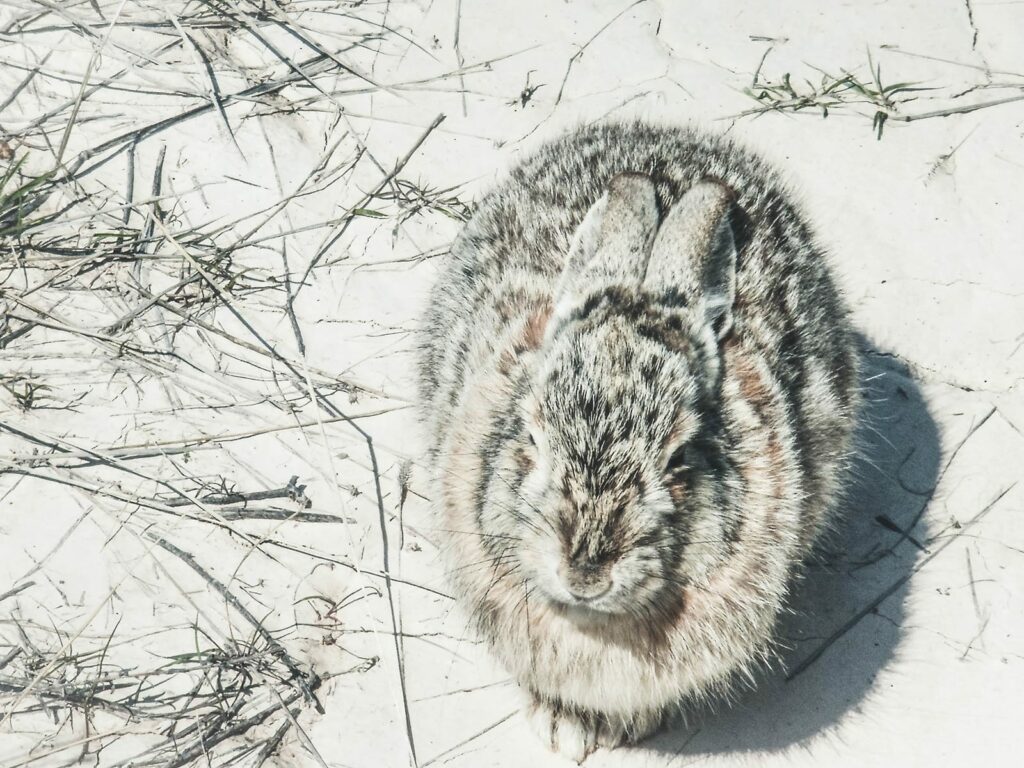
Contents
Winter will cause some critters to disappear quietly from your yard. The squirrels have their stash of nuts, chipmunks are hibernating in their shelters, and most birds have flown south. The ones that you might see more of, however, are the rabbits. Spotting rabbits in the winter does not mean they are more plentiful — it’s because there’s less of everything else.
That, and they are easier to spot hopping across your yard through the snow.
If you have had any problems with rabbits during other seasons, then you should know they won’t stop just because the weather has changed. Rabbits will stay in their own territory, and as long as they have enough food to build an insulating layer of fat in their bodies, surviving the cold won’t be difficult.
To survive the winter, rabbits need to make various lifestyle changes, starting with their diet. Because they do not hibernate and will not travel far for food, they will switch to a coarser, wood-based diet. Their typical food is scarce in winter months, so they will seek what is more readily available.
That change in diet also means a less appetizing food source, which is ingesting their own feces. It is an excellent source of Vitamin B, and provides the needed nutrition when food is scarce. It also allows the complete digestion of food that has already been eaten.
Regardless of their meal, rabbits need to continue to seek food sources that will allow them to build that layer of fat in the body, providing insulation and energy to produce heat. Rabbits will also need to grow a thicker coat of fur to keep warm.
But fur alone won’t be enough. Rabbits will create burrows or seek out hiding places to keep warm, to stay safe from predators, and to be near a food source. They can find all three of those needs close, or even inside, your home.
Normally, rabbits like to find shelter in thick bushes, solid fences, and evergreen trees. They will also look for hollowed stumps or brush piles, but if none of those are easily accessible, your home will create the next best option. Your house will offer a place to hide and to eat, which can allow the rabbit to survive through the winter.
You can minimize the chances of rabbits moving in through a handful of different means. Because they will search out food wherever it is available, they will check your yard for twigs and stems, or even your perennial plants. A wire mesh fence can halt rabbits, as long as you keep it about a foot away from a food source, and that you extend it a couple inches into the ground so they won’t dig underneath it.
Any clutter in your yard will attract rabbits. You might not think much of fallen twigs, branches, or birdseed, but the rabbits will seek whatever food they can get during these colder months. Clearing that clutter away will make your yard less desirable.
Tiny coves or coverings in your yard, such as spaces under your home, deck or porch, are attractive to rabbits. You may not know that they are in there, but if they make that space a long-term home, then once the weather gets nicer, you’ll see those rabbits snacking on more things in your yard and garden. Closing off or patching up those spaces will cause the rabbits to continue on for their search of shelter.
All-in-all, rabbits will not cause you great trouble in the winter, but keeping them out of your yard now can help keep them out of your yard later in the year. For help keeping pests out of your yard, no matter the time of the year, give Van Den Berge Pest Control a call at 616-392-7367. Trust the locally owned, widely renowned experts at Van Den Berge Pest Control for all of your pest needs.
Recent Posts
Eco-Friendly Termite Treatment Options for Homes
Did you know that traditional termite treatments can harm the environment just as much as
Top Eco-Friendly Mosquito Control Services Nearby
If you’re tired of battling mosquitoes but want to keep your outdoor space safe and
Find Local Eco-Friendly Mosquito Control Solutions
Imagine a world where your backyard isn’t a battleground against pesky mosquitoes. Finding local eco-friendly
